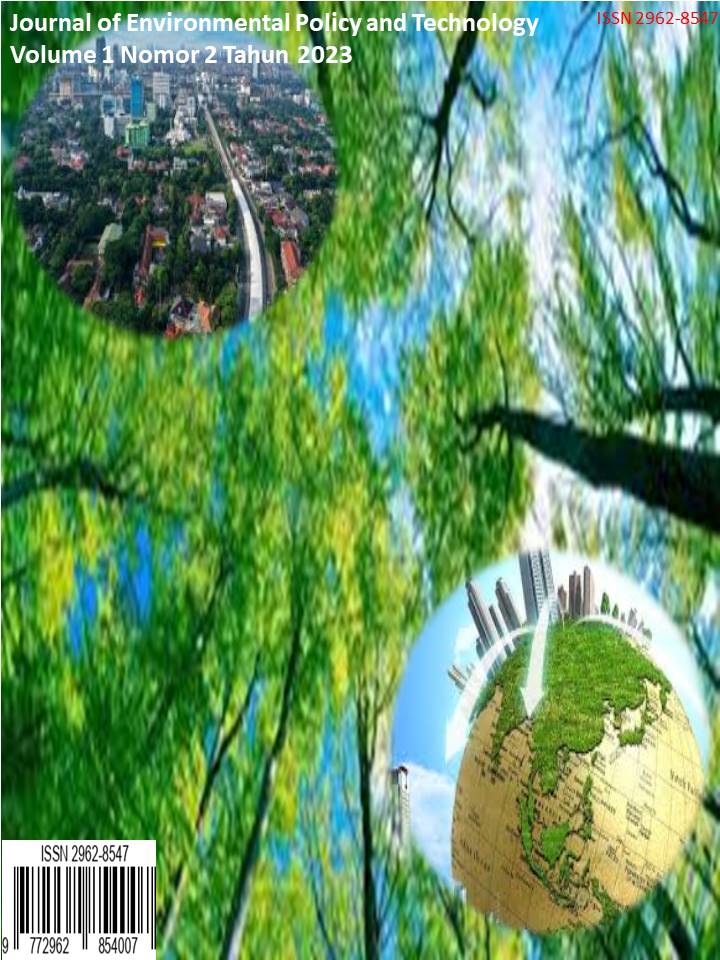KEBIJAKAN STRATEGIS DALAM MERANCANG DAN MEMBANGUN KONSEP SMART CITY YANG BERKELANJUTAN
DOI:
https://doi.org/10.31764/jeptec.v1i2.17006Keywords:
Policy, Smart Cities, Sustainable DevelopmentAbstract
Abstrak: Kemajuan teknologi saat ini mempermudah akses masyarakat terhadap informasi. Kemajuan ini dipandang sebagai ancaman oleh sebagian orang, namun sebagian lain menganggapnya sebagai peluang. Ancaman menjadi lebih gamblang ketika individu gagal beradaptasi dengan keadaan dan menyerah begitu saja pada arus. Oleh karena itu, sangat penting untuk mendorong inovasi baru yang mengubah "ancaman" ini menjadi "peluang" dengan memanfaatkan dan mengembangkan aspek positif dari era globalisasi kita yang selalu berubah. Gagasan tentang kota pintar telah menjadi inisiatif utama bagi pemerintah pusat di seluruh dunia, sebuah strategi yang secara aktif dilakukan oleh kota-kota untuk mengatasi banyak masalah yang beragam. Tidak diragukan lagi, konsep ini dapat dimanfaatkan oleh pemerintah untuk meningkatkan efisiensi dan efektivitas operasional, yang pada akhirnya meningkatkan kualitas hidup semua penduduk perkotaan. Artikel ini mengeksplorasi ide kota pintar dan hubungannya dengan pembangunan kota berkelanjutan. Dimensi konsep kota pintar secara inheren terkait dengan keberlanjutan kota. Diharapkan bahwa pendekatan ini akan bermanfaat bagi para pemimpin politik perkotaan atau regional di masa depan, dan mendorong partisipasi warga untuk mencapai tujuan pembangunan berkelanjutan.
Â
Â
Â
Abstract: Present technological advancements facilitate public access to information. This progress is viewed as a threat by some, yet others perceive it as an opportunity. Threats become more palpable when individuals fail to adapt to circumstances and simply succumb to the tide. Thus, it's crucial to foster new innovations that transform these "threats" into "opportunities" by capitalizing on and fostering the positive aspects of our ever-changing globalization era. The notion of a smart city has become a key initiative for central governments worldwide, a strategy that cities are actively pursuing to tackle a multitude of diverse issues. Undoubtedly, this concept can be harnessed by governments to enhance operational efficiency and effectiveness, ultimately improving the quality of life for all urban inhabitants. This article explores the idea of a smart city and its connection to sustainable urban development. The dimensions of a smart city concept are inherently linked to the city's sustainability. It is hoped that this approach will be of value to future urban or regional political leaders, and encourage citizen participation towards achieving sustainable development goals.
References
Adi, W. B., Sukuryadi, Adiansyah, J. S., Ibrahim, & Johari, H. I. (2022). Analisis Pola Spasial Fenomena Urban Heat Island (UHI) Berdasarkan Faktor Emisivitas Lahan. Geography, 10(2), 6–7. http://journal.ummat.ac.id/index.php/geography/article/view/9740
Ibrahim, I., Johari, H. I., Mas’ad, M., Rochayati, N., Khosiah, K., Sukuryadi, S., Herianto, A., Arif, A., Junaidin, J., & Mahsup, M. (2021). KEGIATAN PENGHIJAUAN DI AREAL HUTAN PENDIDIKAN UNIVERSITAS MUHAMMADIYAH MATARAM. SELAPARANG Jurnal Pengabdian Masyarakat Berkemajuan, 4(2). https://doi.org/10.31764/jpmb.v4i2.4064
Inggi, P., Harry, I. J., & Alfian, P. H. (2020). Partisipasi Masyarakat dalam Pelestarian Kawasan Hutan Mangrove Sebagai Objek Daya Tarik Wisata di Desa Cendi Manik Kabupaten Lombok Barat. Jurnal Perencanaan Dan Pemanfaatan Ruang Berbasis Pengurangan Resiko Bencana, 2.
Johari, H. I., Ansori, R. M., & Hadi, A. P. (2020). Studi Ketersediaan Sumber Air Untuk Pemenuhan Kebutuhan Rumah Tangga di Desa Ranggagata Kecamatan Praya Barat Daya Kabupaten Lombok Tengah. Jurnal Planoearth, 5(2). https://doi.org/10.31764/jpe.v5i2.3248
Krisnadi, I. (2016). Menuju Konsep Smart City. ResearchGate, February 2016.
Malawat, S. H. (2021). IMPLEMENTASI KEBIJAKAN APLIKASI LAYANAN ADMINISTRASI KELURAHAN TERINTEGRASI GUNA MEWUJUDKAN KONSEP SMART CITY di KOTA BANJARMASIN. Jurnal Administrasi Publik Dan Pembangunan, 3(1). https://doi.org/10.20527/jpp.v3i1.3840
Nusamuda Pratama, I., Hadi, A., Zitri, I., & Abstrak, I. A. (2021). Manajemen Bencana Non Alam Covid-19 Dilihat Dari Kepemimpinan Quadruple Helix di Kota Mataram. Jurnal Tata Sejuta STIA Mataram, 7(2).
Pratama, I. N., Ibrahim, A. H., & Akbar, P. (2023). Pentahelix Collaboration Concept as an Effort to Accelerate Poverty Reduction in the Covid-19 Situation in the City of Mataram. Jurnal Public Policy, 9(1). https://doi.org/10.35308/jpp.v9i1.6439
Pratama, I. N., & Mutiarin, D. (2019). FORMULASI KEBIJAKAN TAX AMNESTY UNDANG-UNDANG NOMOR 11 TAHUN 2016. Journal of Governance and Local Politics, 1(1). https://doi.org/10.47650/jglp.v1i1.15
Rahmatullah, A. F., Purnomo, E. P., & Kasiwi, A. N. (2020). Rencana Pembangunan Jangka Menengah Daerah Kota Jambi 2013-2018 Sudahkah Memasukkan Pentingnya Konsep Smart City. Moderat: Jurnal Ilmiah Ilmu Pemerintahan, 6(1).
Sukmatama, W. P., Ashadi, & Prayogi, L. (2019). Penerapan Konsep Smart City pada Desain Kawasan di Cibubur. Jurnal Arsitektur PURWAPURA, 3(1).
Sukuryadi, Harahab, N., Primyastanto, M., & Semedi, B. (2020). Analysis of suitability and carrying capacity of mangrove ecosystem for ecotourism in Lembar Village, West Lombok District, Indonesia. Biodiversitas, 21(2). https://doi.org/10.13057/biodiv/d210222
Sukuryadi, Harahab, N., Primyastanto, M., & Semedi, B. (2021). Collaborative-based mangrove ecosystem management model for the development of marine ecotourism in Lembar Bay, Lombok, Indonesia. Environment, Development and Sustainability, 23(5). https://doi.org/10.1007/s10668-020-00895-8
Sukuryadi, S., Johari, H. I., Rochayati, N., & ... (2021). Comparison of several red edge band sentinel satellite imagery for mangrove mapping in lembar bay lombok Indonesia. … Kajian, Penelitian Dan ….
Sukuryadi, S., & Mas’ad, M. (2018). ANALISIS KELAYAKAN LAHAN PERUNTUKAN PEMBANGUNAN DERMAGA PLTU DI PERAIRAN DESA SUKADANA KECAMATAN BAYAN LOMBOK UTARA. Paedagoria | FKIP UMMat, 7(1). https://doi.org/10.31764/paedagoria.v7i1.175
Wanto, A. H. (2018). STRATEGI PEMERINTAH KOTA MALANG DALAM MENINGKATKAN KUALITAS PELAYANAN PUBLIK BERBASIS KONSEP SMART CITY. JPSI (Journal of Public Sector Innovations), 2(1). https://doi.org/10.26740/jpsi.v2n1.p39-43
Downloads
Published
Issue
Section
License

Journal of Environmental Policy and Technology licensed under a Creative Commons Attribution-ShareAlike 4.0 International License.

